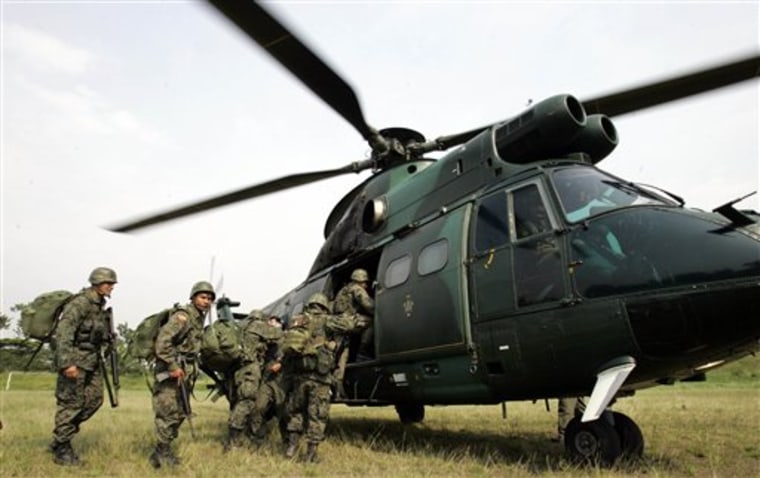Colombia’s police chief on Monday said documents found on a slain rebel’s laptop computer suggest Venezuela recently paid $300 million to Colombia’s largest guerrilla group, perhaps in exchange for the release of six hostages.
Other documents show the rebels had appeared interested in buying uranium, Gen. Oscar Naranjo said at an explosive news conference where he lashed out at Venezuela and Ecuador for the financial and political support they have provided to Colombia’s leftist rebels.
“When they mention negotiations for 50 kilos of uranium this means that the FARC are taking big steps in the world of terrorism to become a global aggressor. We’re not talking of domestic guerrilla but transnational terrorism,” said Naranjo, without giving more details.
Naranjo said the $300 million was mentioned in a Feb. 14 message in the laptop of Raul Reyes, who was killed Saturday in a Colombian military attack just across the border at a rebel camp in Ecuador. Colombia was investigating to determine if the money was intended as payment for Chavez brokering the rebels’ recent release of hostages, he said.
Naranjo said other documents suggest Ecuador’s president is deepening relations with the Revolutionary Armed Forces of Colombia as well — a claim Ecuador denied — and that Manuel “Sureshot” Marulanda, the top FARC leader, is closely allied with the Venezuelan government.
“This implies more than cozying up, but an armed alliance between the FARC and the Venezuelan government,” he said.
Did Chavez get FARC money earlier?
Another document in Reyes’ laptop suggests that rebels have had financial ties with Venezuelan President Hugo Chavez since 1992. At the time, Chavez was jailed for leading a coup attempt, and was plotting the comeback that eventually led to his election as president in 1998.
“A note recovered from Raul Reyes speaks of how grateful Chavez was for the 100 million pesos (about $150,000 at the time) ... delivered to Chavez when he was in prison,” Naranjo said.
The Colombian commando raid that killed Reyes and 16 other rebels has infuriated Chavez and his ally, Ecuadorean President Rafael Correa. Chavez has called Colombia’s President Alvaro Uribe a “mob boss” and a “liar.” Correa has mobilized thousands of Ecuadorean troops toward the border.
“We are accustomed to the lies of the Colombian government,” Venezuelan Vice President Ramon Carrizalez said, dismissing the charges of financing for the rebels. “Whatever they say has no importance. They can invent anything now to try to get out of that violation of Ecuadorean territory that they committed.”
Chavez on Sunday promised Venezuela would respond militarily if Colombia violates its border, where he ordered tanks as well as thousands of troops. He also ordered closed Venezuela’s embassy in Bogota.
Ecuadorean President Rafael Correa said he deployed troops while also withdrawing his ambassador from Bogota and expelling Colombia’s top diplomat.
Correa said Colombia deliberately carried out the strike beyond its borders, flying deep into Ecuador to bomb the rebel camp. He said the rebels were “bombed and massacred as they slept, using precision technology.”
Colombian officials have long complained rebels are allowed to take refuge across its borders in both Ecuador and Venezuela.
Colombian Defense Minister Juan Manuel Santos said Monday that his government isn’t moving any troops and “we have the situation under control.”
A U.S. State Department spokesman, Tom Casey, said the United States supports Colombia’s right to defend itself against the FARC and called for dialogue between Colombia and Ecuador.
“From our perspective this is an issue between Colombia and Ecuador,” he said. “I’m not sure what this has to do with Venezuela.”
Other Latin American leaders including Mexico’s Felipe Calderon and Chile’s Michelle Bachelet offered to mediate.
“A situation like this requires an explanation from Colombia to Ecuadoreans, to the Ecuadorean president and to the entire region,” Bachelet said. “We are very worried.”
At the scene of the attack, Ecuadorean troops covered their faces with bandannas to ward off the stench from bodies splayed on the ground in their underwear. Scattered among the corpses were pieces of clothing, shoes, guns, grenades and a refrigerator.
Soldiers also found three wounded women at the camp — a Mexican philosophy student injured by shrapnel and two Colombians — who were evacuated by helicopter to be treated.
Colombian commandos had removed the cadavers of Reyes and one other rebel.
Indignant, Chavez said “they wanted to show off the trophy” and called it “cowardly murder, all of it coldly calculated.”
“This could be the start of a war in South America,” Chavez said. He warned Uribe: “If it occurs to you to do this in Venezuela, President Uribe, I’ll send some Sukhois” — Russian warplanes recently bought by Venezuela.
“This is saber-rattling, trying to make a point,” said Adam Isacson, an analyst for the Washington-based Center for International Policy, adding that Chavez “has all but said that the FARC will be safe in Venezuela, and that the Venezuelan armed forces would respond to a similar Colombian incursion into Venezuelan territory.”
The situation pushed tense relations between Venezuela and Colombia to a new nadir, though few seem to have an appetite for war. Isacson cautioned that the countries share robust trade, the militaries “are not enthusiastic” and the populations of the neighbors “are hardly consumed by war fever.”
Chavez has increasingly revealed his sympathies for the leftist FARC, and in January asked that it be struck from international terror lists. The group funds itself largely through the cocaine trade and kidnaps for ransom and political ends.
Colombia said military commandos, tracking Reyes through an informant, first bombed a camp on the Colombian side of the border. It said the troops came under fire from across the border in Ecuador and encountered Reyes’ body when they overran that camp. Correa called this version an outright lie — “It was a massacre,” he said.
